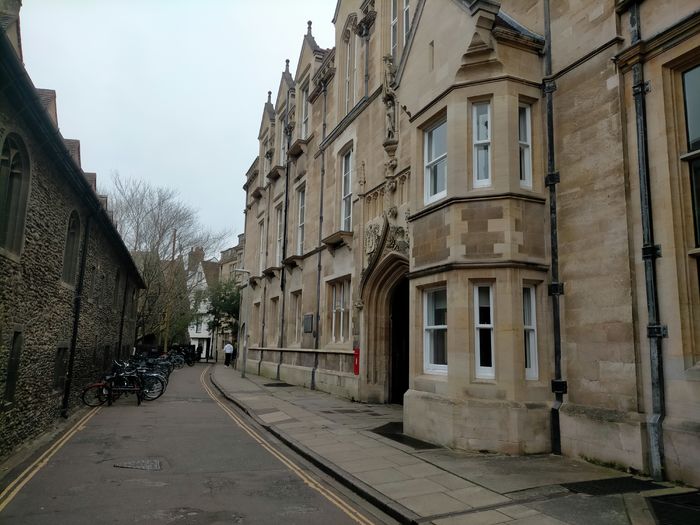Cambridge’s LinkedIn culture has changed the meaning of connection
We should reject the LinkedIn culture of assessing our peers through impressive statistics, and instead look at each other as human beings, argues Daisy Stewart Henderson

LinkedIn culture is a unique beast. While comparison through poised portraits and holiday albums on Instagram may be a sadly universal experience among our generation, comparing your friends’ exam results and their prestigious internships for this purpose is a more distinctly Cantabrigian phenomenon. Over the summer, my mum was somewhat perplexed by my nigh-on-encyclopaedic knowledge of the prestigious schools my peers attended.
“I know of people as a particularly impressive tripos ranking or some example of childhood precociousness, not as human beings”
“But do you even know them?” She asked, and a moment of cold realisation ensued. For the most part, I don’t know them at all. Yet as statistics, as lists of grades and merits, as curated, corporate veneers honed for presentation to the vicious world of online recruitment, my knowledge is thorough. If only memorising the content of my degree was that easy! I know of people as a particularly impressive tripos ranking or some example of childhood precociousness whose digital footprint still haunts them, not as human beings with characters and complexities. And it seems for some in Cambridge, this is just right, as the cultivation of friendships becomes a full-time networking exercise to pursue the most impressive connections and discard those who are not up to scratch.
Anecdotes of stratified interpersonal relationships in action tend to sink right to the pit of my stomach. I have heard fables of people refusing to acknowledge long-standing friends in public due to a perception of them as unsuitable for association, Cambridge students taking a ‘meritocratic approach’ to dating, and unabashed proclamations of only having friends who are intelligent, successful and even attractive. I believe these tales wholeheartedly; they are all too feasible.
It is wholly unnatural that some of my peers revealed their Olympiad successes and outstanding A-Level results to me at our first meetings. At one stage, I was introduced to a ‘genius’ who greets new people with a personalised test of their intellect in order to assess whether they are worthy of further association. Thus, a trend of intellectual posturing and thinly-veiled insecurity emerges. Social engagements become calculations as potential friends are viewed through their utility as connections, an encroachment of LinkedIn culture on an aspect of life that should be wholly divorced from self-aggrandisement.
“University life becomes one big competition, and ultimately, we are all losers”
As extreme as these examples may be, I believe that the Cantabrigian fixation on an appearance of perfection (honed through mediums such as Linkedin) manifests itself in a myriad of ways every day. We encounter ‘candid’ Instagram posts of friendship groups who appear to be uniformly pretty, privileged and poised to the exclusive mystique of the Scholars’ dinner and, more crucially, the whisperings around who was and was not featured on the seating plan. A moment of epiphany for me this term was that the actual numbers printed on the long-feared tripos ranking proved to be largely irrelevant. It was the often-baseless speculation and selective sharing of only the most impressive rankings, often on LinkedIn rather than in genuine conversation, that gave it a vicious edge quite divorced from its numerical reality. University life becomes one big competition, and ultimately, we are all losers.
The paranoia is profoundly individual. We simply care far too much about how we are perceived, to a degree that this anxiety spills the banks of ourselves and floods those around us too. Friendships become appendages; individuals we are supposed to love and trust are reduced to designer handbags to be slung over one’s shoulder and paraded around college before being immortalised in the hall of fame that is an excruciatingly ‘aesthetic’ Instagram feed. Perhaps by hunting the worthy with the fervency of starved beasts before adding them to a long roster of names deemed to be funny, popular, pretty, successful, we can claw back some of these qualities for ourselves to fill the void of insecurity and jealousy borne out of a culture of competition. The mirror held up by the messy and the meaningful may be too much of a reckoning, for it seems that in Cambridge’s hypercompetitive LinkedIn culture, the meaning of ‘connection’ has been corrupted.
I, for one, am opting out. Easier said than done, but if there is one thing I can do, it is to embrace my inner humanities student and totally reject quantification. Tempting as LinkedIn ‘ghost mode’ may be, I no longer want to assess my own worth against carefully curated exhibitions of my peers’ excellence. I just don’t care how impressive my friends are. Radical stuff, I know, but their achievements are not a metric I stand to gain anything from measuring myself against. Accomplished as they are, they impress me far more through their moments of kindness, of funniness, and even, perhaps especially, of messiness. Because genuine friendship is defined by connection of a different kind.
 News / Uni Scout and Guide Club affirms trans inclusion 12 December 2025
News / Uni Scout and Guide Club affirms trans inclusion 12 December 2025 News / Cambridge Vet School gets lifeline year to stay accredited28 November 2025
News / Cambridge Vet School gets lifeline year to stay accredited28 November 2025 News / Cambridge study finds students learn better with notes than AI13 December 2025
News / Cambridge study finds students learn better with notes than AI13 December 2025 Science / Did your ex trip on King’s Parade? The science behind the ‘ick’12 December 2025
Science / Did your ex trip on King’s Parade? The science behind the ‘ick’12 December 2025 News / Pembroke to convert listed office building into accom9 December 2025
News / Pembroke to convert listed office building into accom9 December 2025








